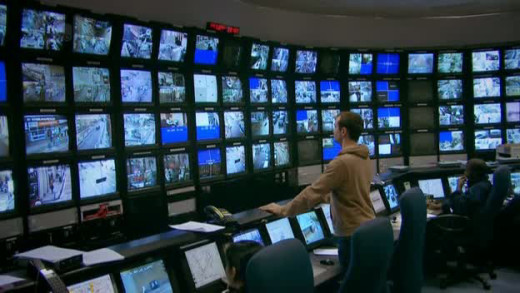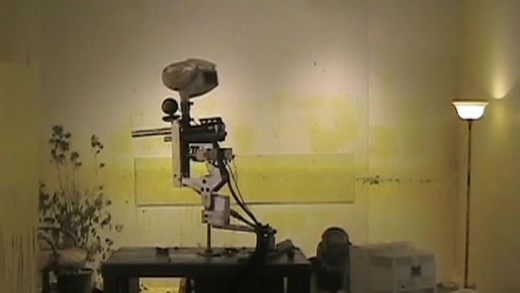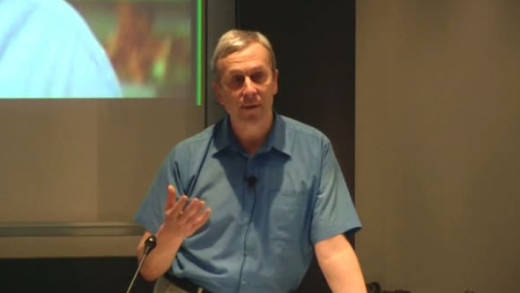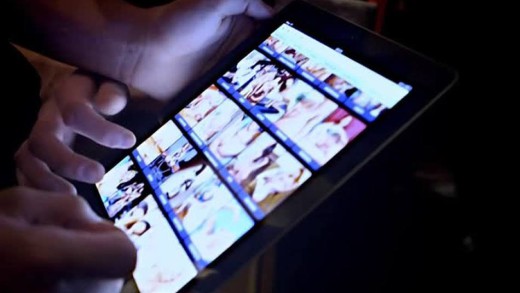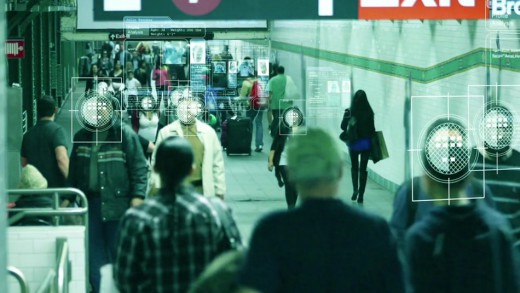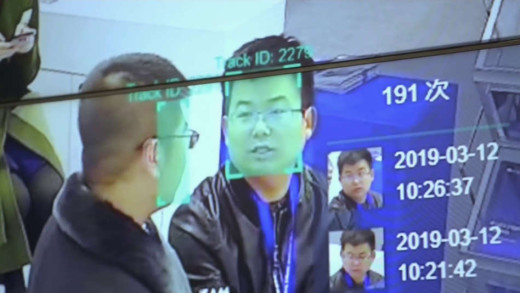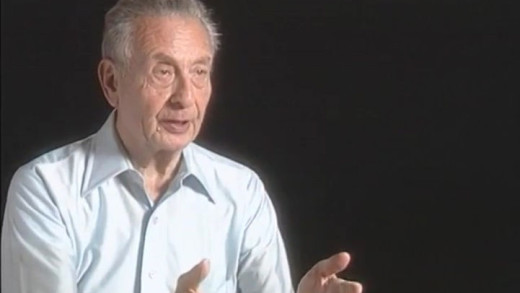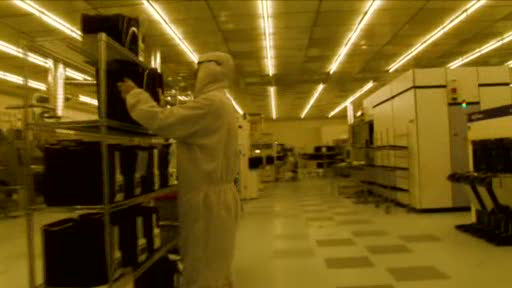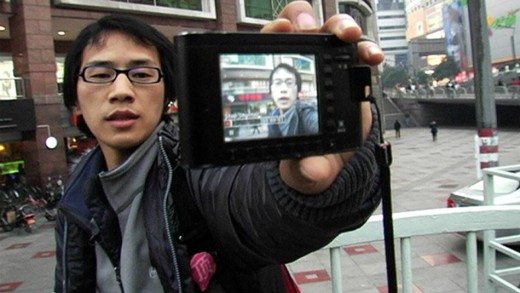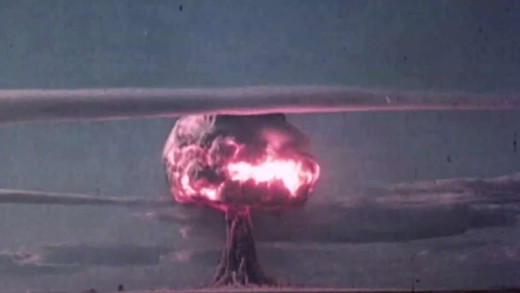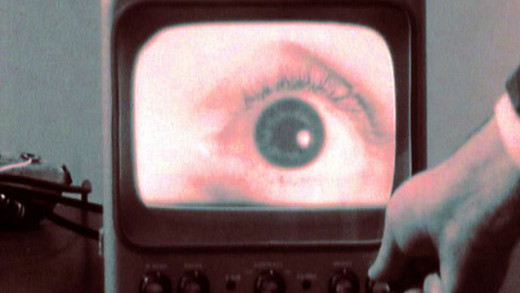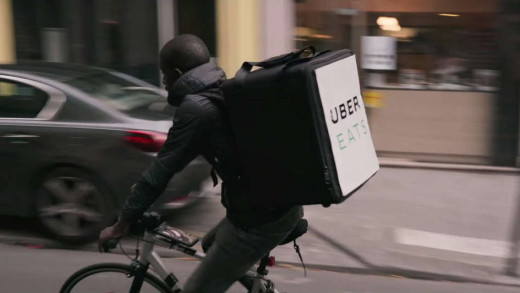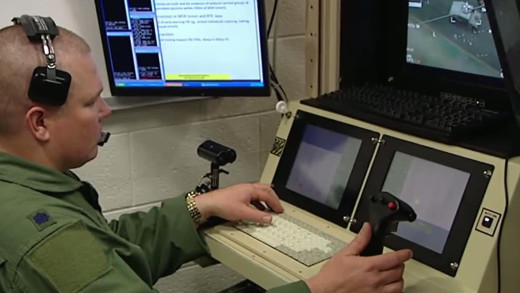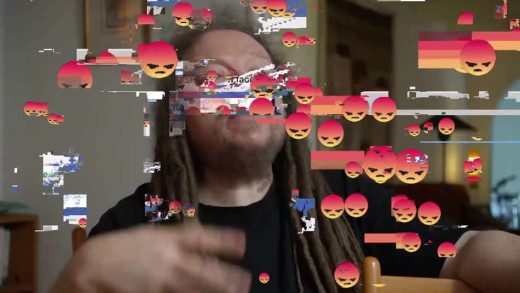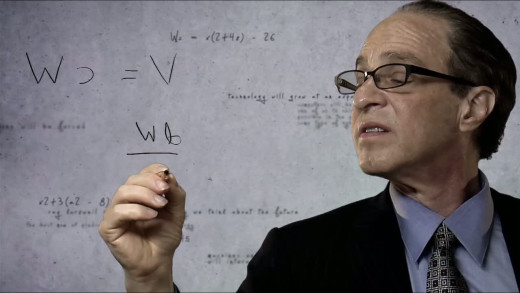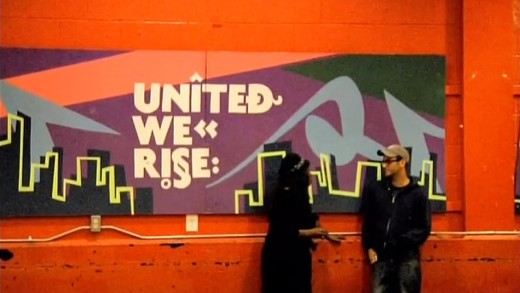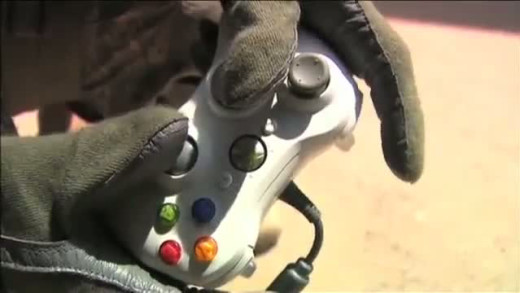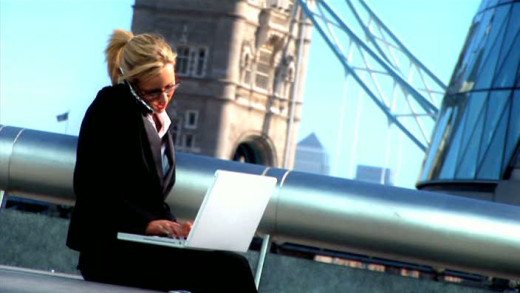Film maker David Bond lives in one of the most intrusive surveillance states in the world -- Britain. When David receives a letter stating that both he and his daughter are amongst the 25 million residents whose details have been lost by the government in a massive data breach, David sets out to investigate some potential impacts of such data being lost in a society of mass surveillance. Erasing David documents the test where David hires two private detectives to track him down as he chooses to 'disappear' for 30 days to see if he can avoid being caught amongst the vast data trails generated by modern society...
How does the military train the solider of tomorrow? Video games. The most popular games are those that replicate as close as possible the war events as seen on the news. Such games now far outpace the biggest Hollywood blockbuster movies, popular music, and best-selling books, combined. What does this complete immersion in high-tech war mean for our political culture? As well as those directly affected by state violence? What does it mean when the technological sophistication of modern militarism become forms of mass entertainment? Returning Fire profiles three artists and activists that decided these questions needed to be answered. We see how Anne-Marie Schleiner, Wafaa Bilal, and Joseph Delappe moved dissent from the streets to the screens, infiltrating war games in an attempt to break their hypnotic spell. The results ask all of us--gamers and non-gamers alike--to think critically about what it means when drones and remote warfare become computer games and visa versa. Can we reflect on our capacity to empathise with people directly affected by the trauma of real war?
Kevin Warwick is a renowned researcher in the precarious field of cybernetics, the study of 'artificial intelligence,' human-control functions, robotics and so-called "cybernetic organisms." His work, as self presented here, shows how implant and electrode technology can be used to control human brain functions, to create biological brains for robots, to enable so-called "human enhancement" and treatment for neurological illnesses. The end goal is transcending human "limitations" or transhumanism, according to Warwick, which inevitably stirs up many social, ethical and practical questions. What are the implications of this work, and this world view?
InRealLife
InRealLife asks: What exactly is the Internet and what is it doing to our children? Taking us on a journey ranging from the bedrooms of British teenagers to the explosive world of Silicon Valley, filmmaker Beeban Kidron suggests that rather than the promise of free and open connectivity, young people are increasingly ensnared in a commercial world. And as this is explained, InRealLife asks if we can afford to stand by while our children, trapped in their 24/7 connectivity, are being outsourced to the web.
Filmmaker Werner Boote travels across the globe to investigate the era of so-called Big Data, where huge amounts of detail about our lives are gleaned for use in decision making, automation, and consumerism, but ultimately, to generate huge profits for corporations that harvest and control our data. Everything's Under Control investigates these modern times through many lenses: People who have studied surveillance culture, to democracy activists in Hong Kong; from educators, advertisers, and traders, to privacy advocates, and security experts; from digital IDs, fingerprinting, iris scans and online profiling, to hacking, data leaks, and invigorating recent historical memory of atrocities based on data and personal information. We hear distorted perspectives on privacy from many voices, challenging the viewer to reflect on what it means to live through the largest social experiment with data ever before conducted on a global scale.
Transhumanists claim a beautiful and apparently now-not-so-distant utopian future made possible by artificial intelligence, life extension and cybernetic technologies. But upon examining the convergence of these technologies and the history behind them, Age Of Transitions details how this movement of "transcending human limits" was born out of pseudo-science eugenics, and what the implications are for a world divided by the have's and have-not's.
The Hacker Wars explores the strange duality of the modern-day computer-hacker as a mischievous provocateur, but also in some cases, societal activists with underlying political fervour, serious or not. The film explores this by profiling some of the renowned characters that have tickled the secretive inner workings of corporations and government agencies for various reasons—ranging from the nefarious and narcissistic, to the political and scandalous. Some do it for the lulz, others do it to prove a point, and others do it to "speak truth to power." In any event, many have faced severe punishments as a result. By following through this, The Hacker Wars touches on issues of whistleblowing, social justice, and power relations, in a time where computer technologies represent extreme power and control. But for whom? And what? This poses the question in deciphering the personalities of the hackers themselves. Are they serious activists with good intentions, or are they driven by insane ideologies?
AI, or Artificial Intelligence, is spouted as the ability of machines to "think" [sic] at a speed and depth far beyond the capacity of any human. Proponents of these digital technologies claim their systems are used in ways that are beneficial for society. But as we see, the current use of AI isn't necessarily aligned with the goals of building a better society. There still remain escalating concerns about labour, the future of work, privacy, the surveillance society, and social control--all valid criticisms that go back many decades--while the rivalry for technological supremacy between the United States and China mirrors the dynamics of the cold war. In the Age of AI is an investigation that touches on these areas, providing a platform to ask fundamental questions about unrestrained technological escalation.
The dominant culture measures itself by the speed of "progress." But what if this so-called progress is actually driving the physical world towards full-force collapse? Surviving Progress shows how past civilisations were destroyed by progress traps—alluring technologies and belief systems that serve immediate needs, but ransom the future. As the total destruction of the environment accelerates and those in power cling to their power ever more tightly in denial, can this globally-entwined civilisation escape a final, catastrophic progress trap?
Through exploring deep questions about the way mainstream media is organised and perpetuated in concert with technological development, media expert George Gerbner delivers a solid indictment of the way the so-called "information superhighway" is now being constructed. Following on from his solid work looking at the impacts of television on society, Gerbner turns to examining emerging technologies like V-chip and the way they interface with globalisation. This film urges the viewer to struggle for democratic principles in this emerging technoculture.
Technocalyps
The latest findings in genetics, robotics, artificial intelligence, bionics and nanotechnology appear in the media frequently, but almost no analysis is found of their common aim which is to "exceed human 'limitations' and capability"—literally to 'transcend' humanity: transhumanism. This three part series covers the notion of transhumanism, the desire of technologists to become physical machines in totality, prompting serious physical, ethical, philosophical and practical questions. Will the transhumanists achieve their sacred so-called singularity? And what will that mean in the real world?
High Tech, Low Life follows the journey of two Chinese bloggers who travel their country chronicling undner-reported news and social issues stories. Using laptops, mobile phones, and digital cameras, both develop skills for reporting while learning to navigate China's continually evolving censorship regime and the risks of political persecution. The film follows 57-year-old 'Tiger Temple,' who earns the title of China's first "citizen reporter" after he impulsively documents an unfolding murder; and 27-year-old 'Zola' who recognises the opportunity to be famous by reporting on sensitive news throughout China. From the perspective of vastly different generations, both personalities must reconcile an evolving sense of individualism, social responsibility and personal sacrifice. The juxtaposition of Zola's coming-of-age journey from veggie-farmer to Internet celebrity; and Tiger Temple's commitment to understanding China's tumultuous past, both provide a portrait of China and of the wider questions facing news-reporting in the age of the Internet.
As the United States developed the world's first nuclear weapons in secret, it was surprised at the speed in which the USSR was able to also develop such weapons, and that such developments would lead to an unprecedented arms race. The USSR was able to obtain all the nuclear discoveries made by scientists who worked on the top-secret Manhattan Project through a very unusual spy, Elizabeth Zaroubin. She managed to gain the trust of great researchers, such as Einstein, in a story comparable to some of the best spy novels ever written.
All Watched Over By Machines Of Loving Grace is a series of films about how this culture itself has been colonised by the machines it has has built. The series explores and connects together some of the myriad ways in which the emergence of cybernetics—a mechanistic perspective of the natural world that particularly emerged in the 1970s along with emerging computer technologies—intersects with various historical events and visa-versa. The series variously details the interplay between the mechanistic perspective and the catastrophic consequences it has in the real world.
HyperNormalisation wades through the culmination of forces that have driven this culture into mass uncertainty, confusion, spectacle and simulation. Where events keep happening that seem crazy, inexplicable and out of control—from Donald Trump to Brexit, to the War in Syria, mass immigration, extreme disparity in wealth, and increasing bomb attacks in the West—this film shows a basis to not only why these chaotic events are happening, but also why we, as well as those in power, may not understand them. We have retreated into a simplified, and often completely fake version of the world. And because it is reflected all around us, ubiquitous, we accept it as normal. This epic narrative of how we got here spans over 40 years, with an extraordinary cast of characters—the Assad dynasty, Donald Trump, Henry Kissinger, Patti Smith, early performance artists in New York, President Putin, Japanese gangsters, suicide bombers, Colonel Gaddafi and the Internet. HyperNormalisation weaves these historical narratives back together to show how today's fake and hollow world was created and is sustained. This shows that a new kind of resistance must be imagined and actioned, as well as an unprecedented reawakening in a time where it matters like never before.
Millions of people around the world are finding work by-the-job online. The "gig economy" is worth more than $5 trillion worldwide, and seemingly growing. But who are these workers? Seduced by the promise of independence, and control over their working hours and income, people around the world that are lured into the gig economy now face the harsh reality of it algorithmically-driven market place: dangerous working conditions, instability, and the precariousness of their work that can stop overnight in the case of deactivation or a bad review. Through committed characters, The Gig is Up shows that the so-called 'freedom' that is espoused by this technological economy is only an illusion.
The latest in the string of controversies as part of the United States' ongoing "war on terror", is the military's growing reliance on "Unmanned Aerial Vehicles" otherwise known as 'drones', evidenced by the international reaction to recent drone missile attacks along the border in Pakistan. The military is also deploying other technological advancements alongside, such as robots in the battlefield and drones that work in swarms. Is this just a big computer game? A new tech-driven arms race? It doesn't end there though -- drones are now creeping into use by police and the intelligence services as a surveillance tool, and even into commercial and civilian use...
TV Family
In 1960, NBC aired what is widely considered to be the first reality television show in American broadcast history. Billing itself as a new kind of visual reporting, the show was called Story of a Family, and it purported to document the day-to-day lives of the 10-member Robertson family of Amarillo, Texas. While the show has long since faded from public memory, media scholars and television historians have long recognised its significance as a precursor to the "unscripted programming" that dominates television today. TV Family draws on this history by interviewing several of the children featured in Story of a Family, to offer a fascinating behind-the-scenes account of how the show was made, and what it means to shape culture. Weaving personal anecdotes with commentary from historians and scholars, TV Family reveals the story of how the show's producers carefully choreographed the way they wanted the family to appear to the American public—all in the name of "authenticity." The result is an eye-opening look at one of television's earliest successes in shaping the reality of family life in commercially viable ways.
Why was the the electric vehicle made by General Motors destroyed in the late 1990s? Why did it receive only limited commercialisation despite being hugely popular? It was among the fastest, most efficient production cars ever built. It ran on electricity, produced no exhaust and catapulted American technology to the forefront of the automotive industry. The lucky few who drove it never wanted to give it up. So why did General Motors suddenly crush its fleet of EV-1 electric vehicles in the Arizona desert? Was it because of a lack of consumer confidence or conspiracy?
The United States of Secrets chronologically accounts the Bush administration's embrace of illegal and widespread dragnet surveillance and eavesdropping programmes, along with the Obama administration's decision to not only continue them, but to dramatically expand them—despite denials and promises to the contrary. By weaving narratives by those who sought to blow the whistle on these programmes over the decades—culminating with Edward Snowden's unprecedented dump of insider documents in 2013—we see how and why those inside the NSA and other government agencies came to act; what actions were effective, and what role the mainstream media had and continues to have in keeping such secret projects alive and untouchable in the name of 'national security.'
This culture runs on algorithms on a scale never before realised. Whether you get a job or a mortgage or insurance or healthcare, how you get from A to B, how huge fortunes are made or whom is driven into poverty, decisions on whom is sent to or released from prison, whom is voted for in manipulated elections--the reach of algorithms has captured so much of the major decisions of our lives, all in complete obscurity, inscrutable. So what are the implications of this? What sort of 'decisions' do machines make, to which we've come to regard as infallible and impartial, accurate and precise? Algorithms Rule Us All speaks to data scientists and programmers themselves to answer the question of what they think is unfolding with the so-called Big-Data society and how we're continuing to hand over our lives and societies to the whim of machines that are driven by rapacious profit-driven companies, for the goal of commodification of everything. What are the implications for human autonomy, society, democracy?
Ray Kurzweil, noted inventor and futurist, is a man who refuses to accept physical reality and the inevitability of death. Instead, he claims that the trending exponential increase in the growth of information technology can continue indefinitely, and that a so-called "singularity" will emerage—a point where humans and machines will converge, allowing one to "transcend" biological "limitations." But there are many who share deep concerns about the consequences of working towards Kurzweil's world...
How to Let Go of the World and Love All the Things Climate Can't Change travels the globe, from New York City to the Marshall Islands and China, to meet with people who are committed to reversing the tide of global warming. The film examines the intricately woven forces that threaten the stability of the climate and the lives of the world's inhabitants.
Hundreds of thousands of mobile phones, LCD screens, TVs, notebooks, tablets, and computers become useless or quickly "out-of-date" and end up in Ghana every year, where children and adolescents dismantle them for "recycling." Welcome to Sodom profiles the life of those who work in the brutal conditions, handling the world's electronic waste, and what they endure to barely make enough money to survive. Many years before the wasteland, Ghana was a beautiful savanna with greenery and animals, now it's a hell of fire, toxins, acrid smoke, plastic, and pollution, at the behest of the global economy and the technoculture that drives it.
Robot Wars
Robot Wars visits companies in the United States that are producing robots for the military to disarm bombs, fly unmanned aircraft (drones), withstand repeated attacks and even choose targets and fire without any human intervention. The rapid development of autonomous robots and the use of them right now is surging ahead at a crazy rate, all with little regard to ethical and psychological questions, concerns about technological privilege and other obvious impacts. With military robots currently being operated using video game controllers, is the line being blurred between fantasy and reality?
Adrift
Adrift is a short film that explores the phenomenon of space junk, where human-made objects launched into space and are now defunct orbit the Earth literally as garbage. The film makes visible some of the immediate impacts and dangers of the technological escalation of this culture, where old satellites, spent rocket stages, and other items orbit the Earth, only to collide with one another at high velocities, generating smaller fragments that collide with other items, and so on. The end point is a cascading complex of junk that engulfs the entire space around the Earth. Adrift aims to make this phenomenon visible, putting a big question mark against the claims made by many futurists and technologists that future space colonisation would even be possible, if only it were a tenable or sensible idea in the first place...
Steal This Film
Presenting accounts from prominent players such as The Pirate Bay, Piratbyrn, and the Pirate Party in the Swedish piracy culture, Steal This Film documents the movement against intellectual property. In particular, the film provides critical analysis of the alleged regulatory capture attempt performed by the Hollywood film lobby to leverage economic sanctions by the United States government on Sweden through the WTO...
Social media networks purport the ability to interact with culture—talking directly to artists, celebrities, movies, brands, and even one another—in ways never before possible. But is this real empowerment? Or do marketing companies still hold the upper hand, as before? Generation Like explores how the perennial quest for identity and connection is usurped in the pervasive game of cat-and-mouse by vast corporate power in the extensive machine for consumerism that is now the online environment. The audience becomes the marketer; buzz is subtly controlled and manipulated by and from real-time behavioural insights; and the content generated is sold back to the audience in the name of participation. But does the audience even think they're being used? Do they care? Or does the perceived chance to be the 'next big star' make it all worth it?
